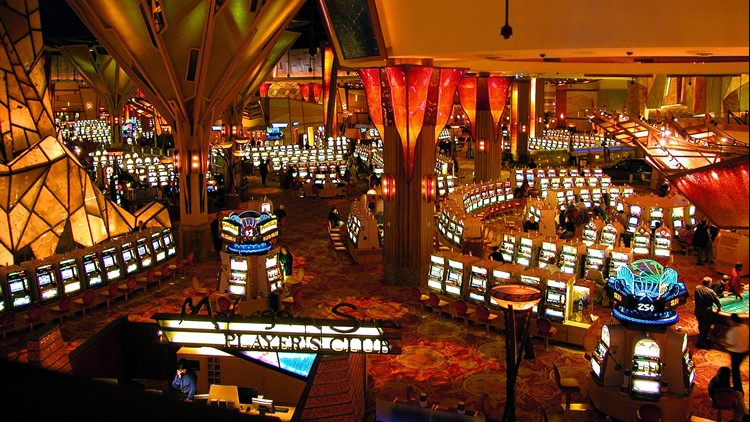UNCASVILLE — No ornate archway marks it. No obvious business district with exotic signs and storefronts sets it apart. But in the quiet neighborhoods around two of the nation’s largest casinos, a sort of suburban Chinatown has been growing for over a decade.
Drawn from New York and Boston by good-paying jobs at the Mohegan Sun and Foxwoods resorts, Chinese and other Asian immigrants have been buying homes, raising families and growing their own food in what had once been largely white communities along Connecticut’s Thames River.
“Fresh air and more trees. I can even fish,” Xu Song Mu, a 62-year-old former Mohegan Sun worker who moved from Queens with his family about eight years ago, said through a translator as he loaded his SUV with fishing gear one July day. “In New York, I couldn’t do that.”
The influx has caused tension with some locals, who complain about too many people crammed into single-family homes and of front lawns in manicured neighborhoods turned into miniature farms to feed large families.
Enforcement, education among the Chinese community and, more recently, big job cuts at the casinos have all helped diminish risky practices like “hot-bedding” — workers cramming into houses and sleeping in shifts — town officials say. But some longtime residents remain unhappy.
“I kind of wish it was quiet like before,” said Peter Bulyk, a 70-year-old retiree whose house abuts a wooded trail many casino workers traverse to get from their homes to Mohegan Sun. “It’s a nuisance hearing them walking and talking all hours of the night.”
Stephen Fan, a 34-year-old Norwich native who has spotlighted his hometown’s Chinese community in an architecture and photo exhibit next on display in Oslo, Norway, said the persistent grumbling shows relations still need work.
“Had these been hipsters from Williamsburg doing the same things — starting little gardens, living communally, walking to work — I think it would have been received very differently,” the Brooklyn designer said.
Many casinos actively recruit Chinese-speaking workers to cater to Chinese patrons, adherents to an ancient gambling tradition who tend to bet big and play for hours.
The Chinese community around Mohegan Sun and Foxwoods started to take shape in the early 2000s as the two casinos, which opened in the 1990s, expanded, and garment factories in New York City, where many Chinese immigrants worked, began closing.
A smattering of Asian markets, restaurants and other enterprises has cropped up along the strip malls, historic main streets and busy throughways leading to the mega-resorts. But the change is most apparent in cul-de-sacs nearest the casinos.
Many homes bought by Chinese immigrants like Xu Song Mu and his two brothers are immediately recognizable by the rows of bamboo and fruit trees, string beans, tomatoes, eggplant, squash and other crops that cover nearly every inch of their lawns.
The changes are also apparent in the public schools, where report cards and other notices sent home with students are translated into Chinese dialects and interpreters are on hand for parent-teacher meetings.
All non-native English speaking Chinese who attended Montville High School from 2003-2014 went to college, with many earning scholarships or admission into top-tier schools like the Massachusetts Institute of Technology, said Robert Thorn, head of the school’s English Language Learners program.
Among those success stories is Yang Xu, a 24-year-old engineer at UTC Aerospace Systems who graduated from the University of Connecticut. His parents left jobs as high school teachers in China for lower-skill jobs at Mohegan Sun over a decade ago so he could get an American education.
“It was a huge sacrifice for my parents,” said Xu, unrelated to Xu Song Mu. “It was almost like they gambled their future for mine.”
But as the Chinese community matures, new challenges are emerging.
The casinos have slashed their workforce as revenues plummet in the face of new competition throughout the Northeast. The contraction means fewer new immigrant families. And some that bought homes just a few years ago are trying to sell so they can seek work elsewhere, town officials and Chinese community leaders said.
Xu Song Mu, a father of two grown children, is among those at a crossroads.
He was laid off from Mohegan Sun in May, and his wife and brothers have also seen their casino hours cut.
The couple’s four-bedroom raised ranch home is likely worth less today than when they bought it in 2007 for $220,000, with similar houses in the area, which hasn’t fully recovered from the recession, selling for closer to $150,000.
For now, though, he and his wife have no plans to pull up stakes. The two say they’re in good health, and Xu, who has been in the country for 30 years and is a U.S. citizen, can draw from his Social Security benefits while his wife works a little longer.
“We’ll be here,” he said. “At least as long as I can drive a car and get around.”



